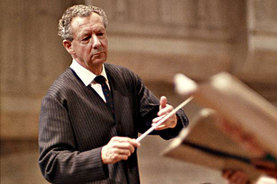The Prodigal Son: A Parable for Church Performance
Music by Benjamin Britten; Libretto by William Plomer
The Prodigal Son: A Parable for Church Performance
This modern opera is one of a series of "parables for church performance" composed and produced by Benjamin Britten, one of the great British composers of the 20th century. The opera's librettist, William Plomer, was a well-regarded British poet during the second half of the century. Its influences include classical opera, Japanese Noh plays, and medieval English mystery plays.
Once again a great modern artist has been drawn to the parable of the Prodigal Son and has retold it for a contemporary audience. And once again a great modern mind has encountered the parable of the Prodigal Son through an encounter with a work of art. Benjamin Britten, the composer, was standing in front of Rembrandt's painting of the Return of the Prodigal in the Hermitage Museum in St. Petersburg when the idea for the opera took root. It was his reflections on that same great painting that inspired Henri Nouwen to pen his meditative masterpiece, The Return of the Prodigal Son. See "Encountering its Spiritual Meaning" on this website for a discussion of Nouwen's book.
There is something powerfully paradoxical about Britten and Plomer's version. As is the case in many modern depictions of the parable, the story is retold meaningfully and movingly and is, at the same time, altered, even subverted. The main character, the Tempter, has been added to the plot of the parable. It is as if Prodigal Son of Jesus' parable meets Satan from Milton's Paradise Lost. The younger son's life in the far country is fleshed out in a modern way. And the older son's action at the end offers a new twist on the old parable. In spite of the many liberties Britten and Plomer take with the plot and characterization of the parable, the point, the character of the parable, remains profoundly intact.
The sub-title is also significant. Britten envisioned this and the other productions in the series as the stories of the church, conveying a core message of the church, and thus staged most appropriately in church buildings.
Encountering Britten's Prodigal Son:
1) Listen to the production, noting the modern musical style of the composition.
The entire opera performed by the City of Birmingham Touring Opera and recorded by BBC Music may be
heard on YouTube. Go to YouTube and search for Britten Prodigal Son.
2) View the production.
Excerpts from the work can be heard/viewed on Youtube at the following links:
In English: Church of the Transfiguration, New York, 2012
http://www.youtube.com/watch?v=AKmr3s3bByM
In German:
http://www.youtube.com/watch?v=PykCQmF-lcg
3) Study the libretto. Click the following link to read, study, and reflect on the libretto. How does the language
express the story? How has the plot been altered by the composer and librettist?
Analyzing Britten's Prodigal Son:
1) After listening to the production, consider the following questions:
2) After watching excerpts from the production, consider the following questions:
3) While studying the libretto, consider the following questions:
This modern opera is one of a series of "parables for church performance" composed and produced by Benjamin Britten, one of the great British composers of the 20th century. The opera's librettist, William Plomer, was a well-regarded British poet during the second half of the century. Its influences include classical opera, Japanese Noh plays, and medieval English mystery plays.
Once again a great modern artist has been drawn to the parable of the Prodigal Son and has retold it for a contemporary audience. And once again a great modern mind has encountered the parable of the Prodigal Son through an encounter with a work of art. Benjamin Britten, the composer, was standing in front of Rembrandt's painting of the Return of the Prodigal in the Hermitage Museum in St. Petersburg when the idea for the opera took root. It was his reflections on that same great painting that inspired Henri Nouwen to pen his meditative masterpiece, The Return of the Prodigal Son. See "Encountering its Spiritual Meaning" on this website for a discussion of Nouwen's book.
There is something powerfully paradoxical about Britten and Plomer's version. As is the case in many modern depictions of the parable, the story is retold meaningfully and movingly and is, at the same time, altered, even subverted. The main character, the Tempter, has been added to the plot of the parable. It is as if Prodigal Son of Jesus' parable meets Satan from Milton's Paradise Lost. The younger son's life in the far country is fleshed out in a modern way. And the older son's action at the end offers a new twist on the old parable. In spite of the many liberties Britten and Plomer take with the plot and characterization of the parable, the point, the character of the parable, remains profoundly intact.
The sub-title is also significant. Britten envisioned this and the other productions in the series as the stories of the church, conveying a core message of the church, and thus staged most appropriately in church buildings.
Encountering Britten's Prodigal Son:
1) Listen to the production, noting the modern musical style of the composition.
The entire opera performed by the City of Birmingham Touring Opera and recorded by BBC Music may be
heard on YouTube. Go to YouTube and search for Britten Prodigal Son.
2) View the production.
Excerpts from the work can be heard/viewed on Youtube at the following links:
In English: Church of the Transfiguration, New York, 2012
http://www.youtube.com/watch?v=AKmr3s3bByM
In German:
http://www.youtube.com/watch?v=PykCQmF-lcg
3) Study the libretto. Click the following link to read, study, and reflect on the libretto. How does the language
express the story? How has the plot been altered by the composer and librettist?
Analyzing Britten's Prodigal Son:
1) After listening to the production, consider the following questions:
2) After watching excerpts from the production, consider the following questions:
3) While studying the libretto, consider the following questions:

